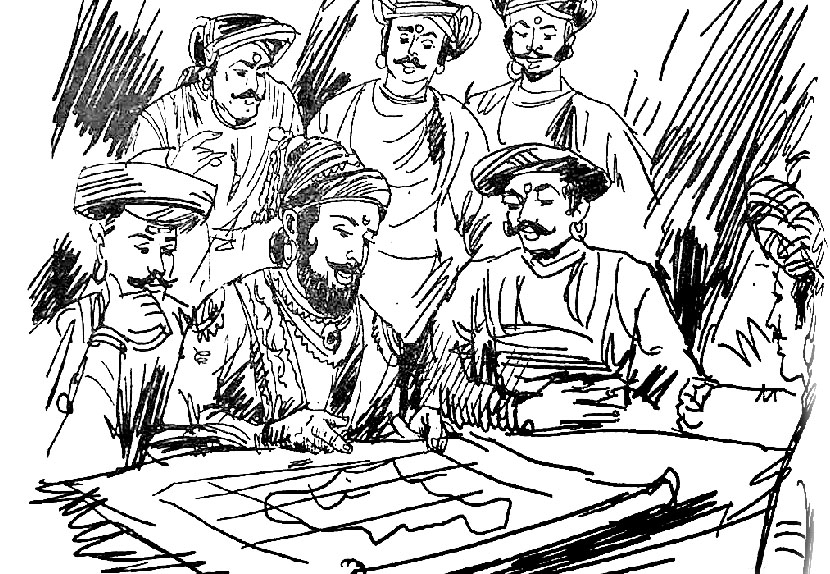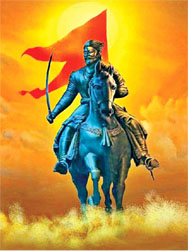Drawing inspiration from Bharatiya epics, Shivaji built up the ordinary Marathas as a strong, formidable fighting force by instilling nationalist ideals that ultimately broke up the Mughal Empire
Shivaji first laid down the concept of Swarajya, which he had imbibed from his mother Jijamata, father Shahji and minister-cum-caretaker Dada Kondev. He taught people the meaning of Swarajya, and imbued them with the indomitable spirit of living and fighting for the ideal. It was indeed a mighty endeavour to convey the meaning of an ideal like Swarajya to people as diverse as the rugged Mavals of Maharashtra’s daunting mountain terrain, the Kolis of the Konkan coastline, the Bhandaris and other communities spread throughout the state, but Shivaji managed to accomplish this. He did not forsake or rebuke those who initially refused to buy into the concept, but was patient and persuasive in explaining to them the imperative of Swarajya. Along with this, Shivaji also imparted the mantra of incessant Swarajya to the warriors who had joined him on this zeal and unflagging commitment to the cause of journey of freedom. Shivaji took care to cultivate the classes along with the masses. He took along veteran sardars (chieftains) like Kanhoji Jedhe and Baji Palaskar. He sounded the clarion call of Swarajya in every nook and corner of the sought realm he inhabited, and at the same time also and received the blessings of eleven spiritual figures and leaders like the illustrious Samarth Guru Ramdas, Sant Tukaram, Baba Yakut and others for his project of attaining Swarajya. Of course, his ideal of Swarajya was not without its opponents among the ruling classes of his day, but with patience and fortitude, Shivaji successfully quelled all opposition and disagreement.
An important reason Shivaji was able to successfully communicate his ideal of Swarajya was that he never believed nor propagated that “Swarajya is my idea”. On the contrary, he would always proclaim in clear words: “Swarajya is the Almighty’s wish”.
When one looks closely at Shivaji’s early team, his companions and associates, and what they accomplished, one begins to somewhat understand the real factors instrumental in his victorious saga. Kanhoji Naik, Baji Palaskar, Chimnaji, Babaji Mudgal Deshpande, Tanaji Malusare, Suryaji Malusare, Kondaji Kank, Bhikhoji, Suryarao Kakde, Baji Jedhe, Tryambak Sondev and Dadaji Narasprabhu Gupte were the prominent ones in Shivaji’s trusted team of worthy individuals.
It is a fact that generally, people who lead have a greater capability of understanding and gauging circumstances and assessing them, as compared to others. They need to possess such skill and capability in order to be effective leaders. In the entire course of his life and particularly his reign, Shivaji did not commit any blunder in his assessment or evaluation of circumstances. His administration, even today, appears to be one that was totally free of any errors. Every leader of course, desires that major tasks and big responsibilities be assigned to him. What is of importance is that he develops an error-free method of working and makes it an intrinsic part of his work and life. It is this efficiency in working and handling responsibilities that determines one’s success or failure in varied and complex tasks like running an administration, preparing a budget, making policies related to agriculture, commerce, science and technology.
Along with this, Shivaji also imparted the mantra of incessant Swarajya to the warriors who had joined him on this zeal and unflagging commitment to the cause of journey of freedom. Shivaji took care to cultivate the classes along with the masses
Shivaji made a thorough and accurate assessment of the contemporary regimes of his day; namely, the Adilshahi of Bijapur, the Qutubshahi of Hyderabad and of the Mughals. He considered the Adilshahi and Qutubshahi sultanates of the south to be those of converts who had become Muslims, while the Mughals were actually the Turks and Pathans who had invaded India from outside. He wished to end the rule of foreign Muslim dynasties and for this purpose, was not averse to seeking the assistance of the Adilshahi and the Qutubshahi regimes, if necessary, Shivaji made efforts to establish diplomatic relations with these two southern powers, sending emissaries and participating in their ceremonies. However, he did not hesitate to punish them whenever they dared cast a baleful eye on his domain. But his behaviour and attitude with the alien Mughals was markedly different. There were no mutual exchanges of any kind. It was this forthright and accurate assessment of the nature of the Mughal regime that saved Shivaji from their malevolent designs and depredations. This very qualities of Shivaji find a telling mention in the memoirs of British Military Secretary Philip when he writes: “Had Shivaji lived for five or six years more, we Englishmen could not have ruled India”.

James Douglas too writes in the same vein: “It was a great mercy Shivaji was not a sea man; otherwise, he might have swept the sea as he did the land with the wisdom of destruction”.
Shivaji as a Military Strategist
It is this capability of assessment that determines the future of action plans drawn up. The Ford and General Motors automobile companies, who once literally ruled the automobile world, were busy designing bigger and more expensive vehicles in the sixth and seventh decades of the last century when Japan’s Toyota, Honda and Suzuki companies were engineering new designs for smaller, cheaper and more fuel-efficien cars. The results of those respective engineering endeavours are apparent to us today. Today, it is Japanese cars that flood the market. Toyota alone chalked up a profit of $13.1 billion in the year 2007, whereas in the same year, General Motors suffered a loss of $38.7 billion while Ford took a beating of $12.7 billion. It is this very error in proper assessment of circumstances and needs that results in corporations and governments either going bust or becoming sick.
Shivaji was near-flawless in his assessment of all tasks, big or small, which he undertook in his lifetime. It is essential that those who provide leadership today, whether at the societal or governmental level, emulate Shivaji
In his day, Shivaji made a bold decision to field his smaller and medium sized naval vessels against the much heavier vessels of the English, French and Portuguese navies. The bigger ships of the European naval powers were heavily reliant on favourable wind conditions for setting to sail. Owing to their size, these ships were unable to venture into narrower creeks. Shivaji, on the other hand, took the initiative for the design and construction of smaller ships keeping in mind the geographical makeup of his kingdom and its special needs. These small but no less effective naval ships, built to serve the needs of Shivaji’s Swarajya, drew the wholesome praise of even his contemporary adversaries.
Shivaji was near-flawless in his assessment of all tasks, big or small, which he undertook in his lifetime. It is essential that those who provide leadership today, whether at the societal or governmental level, emulate Shivaji in enhancing their capabilities in the very crucial task of assessing their strengths and weaknesses and also the extent and challenges of the responsibilities they bear.
(Excerpts taken from Anil Madhav Dave’s book Shivaji & Suraj: An Iconic leader & Good Governance)














Comments